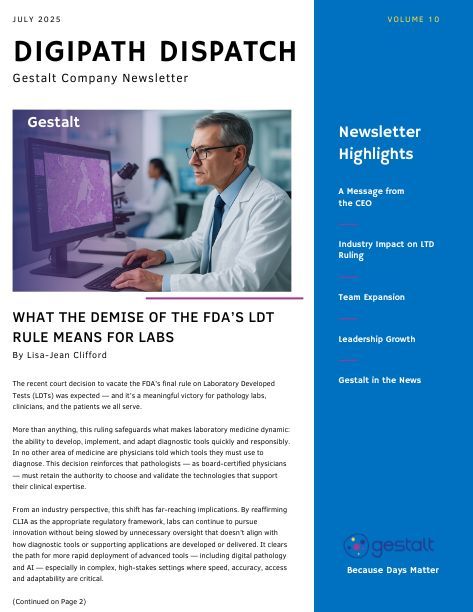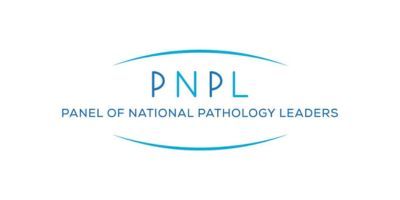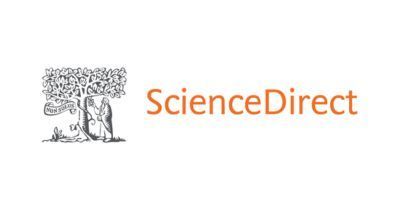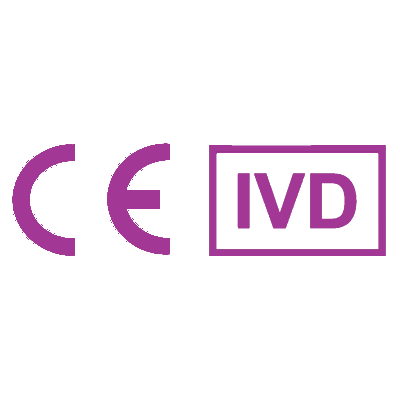Inc. 5000 Named Gestalt No. 3835 Among America’s Fastest-Growing Private Companies
"Gestalt Ranked 223rd in the Healthcare Services Sector."
August 15, 2023 – Spokane, WA. –– Inc. revealed that Gestalt Diagnostics, a leading provider of artificial intelligence (AI) powered digital pathology solutions, ranks No. 3835 on the 2023 Inc. 5000 list, the most prestigious ranking of the fastest-growing private companies in America. In addition to this honorable rank, Gestalt Diagnostics is the 223rd fastest-growing private company in the healthcare services sector. The list represents a unique look at the country's most successful private businesses and is a key benchmark for entrepreneurial success.
"We are honored and proud to be ranked as the 3835th fastest-growing private company in the US by Inc.," stated Dan Roark, CEO of Gestalt. “The dedication, commitment, and success of our team, solutions, and customers is exemplified in the attainment of this achievement. Gestalt’s unwavering commitment to advancing the adoption of innovative, industry-leading solutions to provide better cancer healthcare and precision medicine is essential to improving patient outcomes and ultimately making a meaningful difference in the lives of patients and their families.”
This recognition serves as a resounding validation of the remarkable strides made by Gestalt in enabling better patient care and furthering drug discovery through innovative digital solutions.
“Running a business has only gotten harder since the end of the pandemic,” says Inc. editor-in-chief Scott Omelianuk. “To make the Inc. 5000—with the fast growth that it requires—is truly an accomplishment. Inc. is thrilled to honor the companies that are building our future.”
Gestalt’s inclusion on the Inc. 5000 list comes at a significant time of growth for the company, through its digital solution PathFlow® over 280 pathologists are diagnosing over 90,000 cases, with 5% diagnosed utilizing leading-edge AI algorithms with formidable computational capabilities, managing over 2,800,000 images. Today, PathFlow® enables pathologists to provide faster and more accurate diagnoses* resulting in improved patient care and pathologist experience.
About Inc. and the Inc. 5000
Companies on the 2022 Inc. 5000 are ranked according to percentage revenue growth from 2019 to 2022. They must be U.S.-based, privately held, for-profit, and independent as of December 31, 2022. The minimum revenue required for 2019 is $100,000; the minimum for 2022 is $2 million Inc. Business Media is the leading multimedia brand for entrepreneurs. Inc.’s proprietary Inc. 5000 list, analyzes company data to rank the fastest-growing privately held businesses in the United States. To learn more, visit http://www.inc.com/inc5000.
Read the original release on PRNewswire.
*Research Use Only (RUO) unless following CAP guidelines for LDT. CE-certified per in vitro diagnostic Medical Device Directive 98/79/EEC.
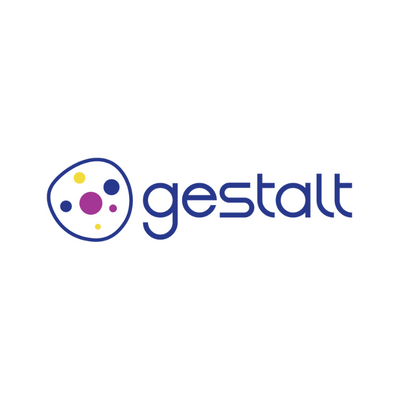
By Maarion Napora At Gestalt, we understand the role of education for physicians and why it is important to have a focus specifically on pathology. It is our goal to provide the proper digital tools and platforms for pathologists to learn how to use the latest technology in their training. PathFlow ’ s Education Module provides academic medical centers and residency programs with leading tools and digital technology to train the next generation of pathologists. Designed to meet the demands of modern techniques, the module offers the ability to develop courses, easily clone and copy courses, and assign teaching lists, images, and tests. You can set the timing for a course, automatically send out messages to remind students of outstanding courses and test deadlines, etc. We support multiple forms of media, including videos, PowerPoint presentations, and word documents. These enable educators to deliver immersive, digital-first learning experiences. The PathFlow Education Module Revolutionizes pathology training by providing a unified platform for interactive learning. Trainees can access a comprehensive library of annotated digital slides, practice diagnosing complex cases, and receive real-time feedback. Professors can easily grade, provide comments and feedback on assessments, and can even assign certificates. The module’s credentialing management capabilities streamline competency assessments, notifications for deadlines, and reminders if not completed, ensuring residents meet rigorous standards while tracking progress seamlessly. We believe education and access to leading technology is the cornerstone of advancing pathology. With PathFlow’s Education Module, we’re empowering academic programs to train confident, tech-savvy pathologists, who will lead the field forward with current skills in available technology informatics.

Spokane, Washington, July 9, 2025 – Gestalt, a leading provider of AI-powered digital pathology solutions, showcased its AI-powered pathology platform, PathFlow, at the Spring 2025 DICOM WG-26 Interoperability Connectathon, confirming its readiness for real-world clinical integration and multi-vendor environments. The Connectathon was co-sponsored by the Digital Pathology Association (DPA) and the European Society of Digital and Integrative Pathology (ESDIP). The event, hosted virtually from January to June and featured at the European Congress on Digital Pathology in Barcelona, brought together over 30 organizations to validate end-to-end workflows, in varying categories, using DICOM standards. The categories included image acquisition, storage, viewing, and AI-driven annotations. Gestalt’s platform stood out as a leader in interoperability, particularly as an Image Display (Viewer). Gestalt’s Viewer successfully displayed images from 8 of 9 different WSI Scanners, demonstrating seamless compatibility with multiple diverse systems such as 3DHISTECH, Grundium, Leica, Hamamatsu and Pramana. This robust performance ensures pathologists can access high-quality whole slide images effortlessly, regardless of the source, streamlining diagnostic workflows. Additionally, PathFlow excelled in displaying annotations from five AI Evidence Creators, including industry leaders like Visiopharm, Hologic, TechCyte and identify.bio, further demonstrating its ability to present structured data for precise diagnostic insights. As an Evidence Creator itself, (AI Annotations), Gestalt showcased its advanced AI capabilities, by analyzing and annotating images from eight scanners. These annotations were successfully transmitted to five different image management archives using standard DICOM Web protocols, highlighting Gestalt’s ability to deliver accurate, standards-compliant AI-driven outputs. This functionality empowers pathologists to integrate AI seamlessly into routine clinical operations, improving efficiency and diagnostic accuracy. “Gestalt’s performance at the Connectathon reflects our dedication to building interoperable, scalable solutions that empower pathologists globally,” said Brian Napora, VP of Innovation, Gestalt Diagnostics. “By investing in open standards, we’re helping lead digital pathology toward a more integrated and intelligent future.” The Connectathon’s rigorous testing environment validated Gestalt’s ability to handle real-world challenges, such as legacy image integration and complex multi-vendor workflows without requiring custom workarounds. Gestalt’s commitment to DICOM standards positions PathFlow as a cornerstone for vendor-neutral, future-ready pathology solutions. About Gestalt Gestalt Diagnostics is a Spokane-based company dedicated to revolutionizing pathology through digital solutions. Founded in 2017, Gestalt provides advanced technology, proven digital expertise, and artificial intelligence to enable pathologists to diagnose diseases faster and more efficiently. The company's PathFlow platform is at the forefront of digital pathology innovation, offering significant improvements in diagnostic accuracy and workflow efficiency. To learn more, visit www.gestaltdiagnostics.com and follow @Gestalt on LinkedIn

Spokane, Washington, June 17, 2025 – Gestalt, a leading provider of AI-powered digital pathology solutions, today announced the addition of Dr. Renuka Kulkarni, MD, as Chief Medical Officer (CMO). A physician scientist with over 20 years of experience in surgical and digital pathology, Dr. Kulkarni will join the team in guiding Gestalt’s product direction and clinical usability. Dr. Kulkarni brings a rare blend of diagnostic precision and scientific innovation to the organization. Her expertise in breast pathology, immunomarkers, machine learning, and image analysis strengthens Gestalt’s mission to revolutionize diagnostic workflows and clinical decision-making through technology. “Renuka’s addition signals our deepening investment in the future of pathology,” said Lisa-Jean Clifford, President of Gestalt Diagnostics. “Her leadership and experience at the intersection of clinical insight, AI, and enterprise lab operations will ensure our solutions continue to serve both pathologists and the patients they care for.” Before joining Gestalt, Dr. Kulkarni played a pivotal role in developing one of the earliest digital pathology programs at a leading full-service reference laboratory. Her extensive hands-on experience with Gestalt’s solutions, as a customer and direct user for four years, along with image analysis platforms, and combined with her understanding of real-world lab operations, positions her to help bridge the clinical and commercial realms—ensuring the scalability and impact of Gestalt’s solutions. As CMO, Dr. Kulkarni will help shape the development of next-generation diagnostic tools, supporting Gestalt’s mission to enhance diagnostic accuracy, efficiency, and interoperability across health systems worldwide. “I’m honored to join Gestalt at such a transformative moment in digital pathology,” said Dr. Kulkarni. “Together, we have the opportunity to shape solutions that truly serve pathologists and ultimately improve outcomes for patients everywhere.” About Gestalt Gestalt Diagnostics is a Spokane-based company dedicated to revolutionizing pathology through digital solutions. Founded in 2017, Gestalt provides advanced technology, proven digital expertise, and artificial intelligence to enable pathologists to diagnose diseases faster and more efficiently. The company's PathFlow platform is at the forefront of digital pathology innovation, offering significant improvements in diagnostic accuracy and workflow efficiency. To learn more, visit www.gestaltdiagnostics.com and follow @Gestalt on LinkedIn

Date : Wednesday, May 21, 2025 Time : 1:45 PM Location : Auditorium 1, Marriott Eagle Crest Resort (Ann Arbor, Michigan) Session Title : The Long-Term Advantages of Digital Pathology are Only Realized Through True Interoperability We’re proud to announce that Lisa-Jean Clifford , COO & Chief Strategy Officer at Gestalt Diagnostics, and Sumie Edwards (ARUP) will take the stage at the 2025 Pathology Informatics Summit to share key insights into the critical role of interoperability in digital pathology. In this featured session, Lisa-Jean will explore: Why interoperability is the linchpin for scalable, future-ready digital pathology programs How health systems can unlock long-term value and efficiency through seamless integration Real-world considerations for IT infrastructure, workflow design, and cross-platform compatibility Her session will offer a strategic lens into how institutions can achieve meaningful digital transformation, not just implement new tools. About the PI Summit : The Pathology Informatics Summit is a premier annual event for professionals at the forefront of digital pathology, laboratory medicine, AI, and healthcare data innovation. It brings together leading physicians, researchers, and informaticists to discuss the rapidly evolving field. Mark your calendar for May 21 at 1:45 PM to hear Lisa-Jean share her vision for a more connected and impactful future in pathology.

Date : Thursday, May 22, 2025 Time : 9:00 AM – 12:00 PM Location : Auditorium 1, Marriott Eagle Crest Resort (Ann Arbor, Michigan) Panel Title : API Focus Session: Expert Panel on LDT Regulation Overhaul and Data Challenges in Pathology Informatics Join Lisa-Jean Clifford , COO & Chief Strategy Officer at Gestalt Diagnostics, for an important panel discussion at the 2025 Pathology Informatics Summit alongside top voices in the field of pathology informatics. This focus session will dive into: The impact of the FDA’s Final Rule on Laboratory Developed Tests (LDTs) Data governance, standardization, and access challenges for AI in pathology The urgent need for broadly sourced datasets to support the next generation of clinical AI models Panel Moderator : Ulysses Balis, MD Expert Panelists : Victor Brodsky, MD – Washington University School of Medicine, St. Louis Lisa-Jean Clifford – Gestalt Diagnostics Bruce Friedman, MD Ronald Jackups, MD, PhD – Washington University School of Medicine, St. Louis Amrom Obstfeld, MD, PhD – Children’s Hospital of Philadelphia Michelle Stoffel, MD, PhD – University of Minnesota J. Mark Tuthill, MD – Henry Ford Health System This dynamic session includes two panel discussions followed by open Q&A: The FDA’s Final Rule on LDTs The Growing Crisis of Limited AI Training Data in Pathology Why it matters : With regulatory landscapes shifting and AI innovation surging, this session offers a rare chance to hear from experts shaping the future of diagnostics, data ethics, and clinical technology adoption. Don’t miss this opportunity to learn from Lisa-Jean and fellow leaders who are building the next chapter of pathology informatics.

Spokane, Washington, April 28, 2025 – Gestalt, a leading innovator in AI-powered digital pathology solutions, announced the completion of a $7.5 million Series A financing. The round was led by Cowles Ventures, TVF Funds, Inland Imaging Investments, KickStart Funds, and prominent angel investors from the Pacific Northwest. Gestalt’s PathFlow® platform is used by leading healthcare, academic medical centers, and research organizations. Customers implement PathFlow as their preferred solution because it integrates seamlessly into their existing laboratory information systems, enabling faster, more accurate diagnoses and improving access to expert consultation, education, and research—regardless of location. "PathFlow is transforming pathology by leveraging robust digital workflows and AI algorithms to support scoring of key biomarkers. This enables organizations to accurately match patients to known therapies and generate rich datasets for research and new drug development," said Dan Roark, CEO, Gestalt. "Our technology is designed to improve patient outcomes by enabling faster, more accurate diagnoses and broadening access to clinical expertise." This new funding will facilitate broader market adoption and increased profitability. The capital will be used to expand the company’s customer base, enhance AI capabilities, and pursue FDA clearance. This comes at a critical moment, with rising cancer rates and a declining number of practicing pathologists intensifying the need for scalable, digital-first diagnostic solutions. “We are incredibly grateful for the continued support from our investors,” Roark added. “This funding allows us to expand on the solid foundation we’ve built. We’ve already streamlined how pathologists navigate fragmented systems by creating PathFlow, a unified platform for viewing pathology cases digitally and collaborating with leading experts in real-time without the need to ship specimens. Now, we’ll accelerate innovation and scale our reach to meet the growing demands of modern pathology.” Gestalt is at the forefront of a critical shift in diagnostic medicine, helping transform pathology from a manual, microscope-based process to a scalable digital solution leveraging artificial intelligence tools — like the digital transitions already seen in radiology and cardiology. The company’s platform not only improves diagnostic speed and precision which is critical for cancer patients who can wait for days to weeks or more for a diagnosis, but also unlocks AI-powered insights that enable: Biomarker scoring to support the optimization of patient-therapy matching, Image and data analysis for disease progression studies, And the interoperability that enables pathologists access to valuable aides and insights that streamline their workflows, highlight areas of positivity and reduce missed diagnoses. With this Series A funding, Gestalt remains committed to expanding its impact through the deployment of its’ PathFlow software in healthcare, making high-quality, scalable pathology solutions more accessible to clinicians and researchers worldwide. About Gestalt Gestalt Diagnostics is a Spokane-based company dedicated to revolutionizing pathology through digital solutions. Founded in 2017, Gestalt provides advanced technology, proven digital expertise, and artificial intelligence to enable pathologists to diagnose diseases faster and more efficiently. The company's PathFlow platform is at the forefront of digital pathology innovation, offering significant improvements in diagnostic accuracy and workflow efficiency. To learn more, visit www.gestaltdiagnostics.com and follow @Gestalt on LinkedIn


